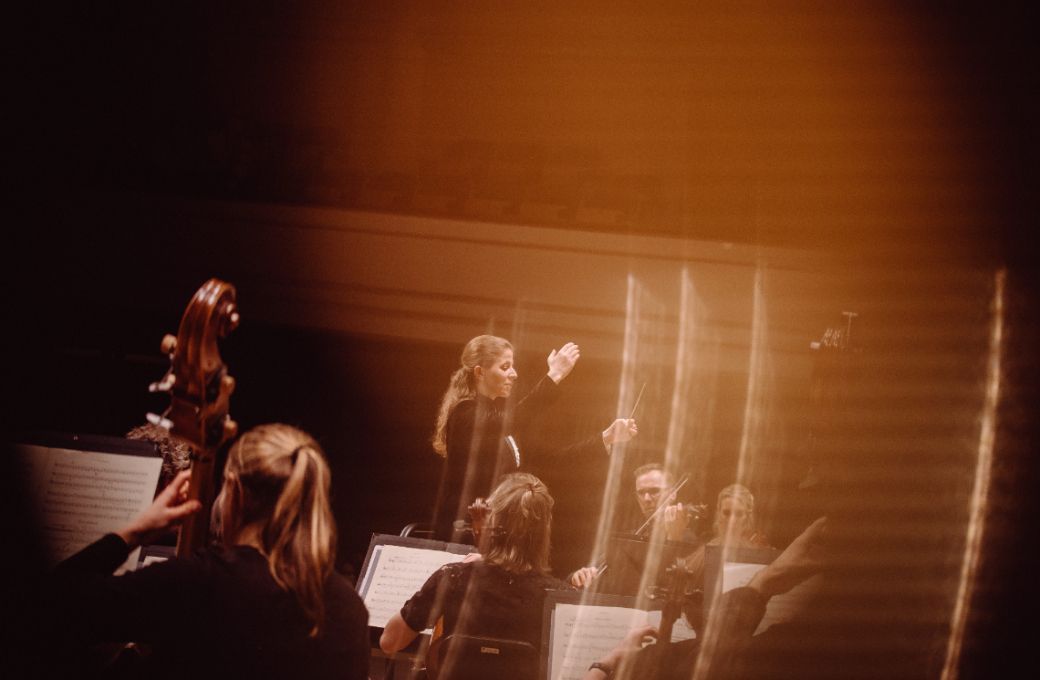The fact that Kristiina Poska is left-handed gives her lithe, impulsive style something cool and angular. Chief Conductor of the Flanders Symphony Orchestra since 2019, her recordings of Franck and Beethoven seem to completely lay out the tactile sinews and nerves of the music. The integrity she gives to line, and the care with which she has studied the scores’ myriad expressive markings, result in the kind of musical clarity usually confined to the inside of composers’ heads. The bite on the string, the rasp of the horn, and the rattle of the drum – all are so clearly audible that when the silences come, they are deafening.

I ask if her left-handedness poses problems for orchestral musicians. “My professor told me, back when I started that in Estonia, that being left-handed means one very clear thing: that your left is your leading hand and that is your nature. ‘Don’t underestimate musicians,’ he said. ‘They are not stupid. Whichever side the downbeat is on, it’s the same.’ It’s a little joke,” she says, “but it’s also the truth.” Poska admits to a time when she was working at the Komische Oper in Berlin, she considered relearning her technique and conducting with her right hand. “I even had a conductor friend who told me, ‘Kristiina, you’re already a woman – being left-handed is one thing too much.’ But talking to different musicians whose opinion I trusted, they all said that it was not an issue. ”
There was clearly no issue this season for the Minnesota Orchestra and Oregon Symphony, the NHK Symphony in Tokyo, the Concertgebouworkest and the Orchestre Philharmonique de Radio France, each of which Poska has conducted for the first time. She has continued to be busy at European opera houses too – this year she conducted Yuval Sharon’s Die Zauberflöte at the Staatsoper Berlin and Così fan tutte at the Norwegian National Opera.
Poska has also become an eagerly-anticipated visitor to the UK. When she took the Komische Oper’s Zauberflöte to the Edinburgh Festival in 2015, David Smythe described Poska as “superb, bringing out the playfulness of Mozart’s score with a filigree lightness of touch, allowing the singers to shine through.” When she performed in Edinburgh’s Usher Hall this past October with the Scottish National Symphony Orchestra, she tells me “it was an amazing experience. I had been there as a listener but to go as a conductor – it was totally different. The acoustics are absolutely phenomenal. I love it.”
This year, Poska will return to Usher Hall as part of the Flanders Symphony’s UK tour, joining the Sheffield Philharmonic Chorus for a three-concert series 21st–23rd June: Cadogan Hall in London, City Hall in Sheffield, and Usher Hall in Edinburgh. The goal: to alchemize Mozart’s Don Giovanni overture and Beethoven’s Eighth Symphony in the first half with Mozart’s Requiem in the second.
“It could be risky,” Poska says, “starting with the dark energy of Don Giovanni. Then the Eighth Symphony, yearning for connections with something which is not of this normal earthly life, having this enormous energy, this urge toward something higher. You can hear this in Beethoven’s Fifth Symphony, but in the Eighth especially you feel the soul of the music urging for a kind of spiritual enlightenment. From the beginning we are already in a state of ecstacy: the symphony starts immediately, not even introduced by the two opening chords of the Eroica, which were already totally revolutionary. And then it looks backwards to Haydn with all the jokes. It’s those contradictions that make it so interesting. When we observe it with fresh new eyes, we see it’s full of beautiful surprises and light-hearted, even euphoric, and very joyful. It has its dramatic places – the typical Beethoven – but at the same time it’s shorter and super compact. Overall there is more material in it than you can even digest.”
Poska counts her masterclasses with period instrument icon Reinhard Goebel as one of her most crucial learning experiences, lying behind her attraction to and success with Beethoven. “It was profoundly liberating,” she said. “We spent four long days studying manuscripts and working with an orchestra. There was so much information – and it was so interesting thinking about what could be possible with modern instruments and a knowledge of Classical style.”
Of Mozart’s Requiem, Poska says its place on the program is due to its message of “hope for a better life, that life goes further and we go to a better place. We use the Süssmayr edition which ends with the ten pages of authentic Mozart, because I believe that he would written something positive and transformative. To hear it even now, in this version, which repeats the first part, makes a great impression.” Poska tells me that, among the soloists, soprano Yena Choi and mezzo Kadi Jürgens have Estonian connections, the South Korean Choi living in Estonia and “singing a lot. She’s also in the Philharmonic chamber choir, and works a lot as a soloist. Kadi Jürgens is Estonian, and is living in Belgium here in Ghent and has been studying at the Ghent Opera Academy; she has a great voice and is beginning a wonderful career. Our tenor is Denzil Delaere and our bass-baritone Christian Immler. I’m very happy with the way they all meld together.”
The Flanders Symphony, in residence at the Muziekcentrum De Bijloke in Ghent, was founded in 1960 and takes its concerts on the road to Antwerp, Bruges, and other Belgian venues, as well as abroad including visits to the UK. In 2019 Alexander Hall wrote enthusiastically about the orchestra’s clarity of sound, the “attack and athleticism” of the strings and the “confident, fresh and translucent” playing of the woodwinds and brass. “It’s that sound that was one of the reasons I fell in love with them immediately,” Poska says.
“We draw on musicians from Flanders, many of whom are connected to our local music schools, which helps to maintain the special sound,” Poska continues. “Critics from outside have heard that – we were recently listed as one of eight orchestras which had their own distinctive sound.” Flanders Symphony’s season finale this year – titled Lust for life and irony – will consist of Prokofiev’s Overture on Hebrew Themes, Shostakovich’s First Cello Concerto with the young French cellist Ivan Karizna, and, in preparation for their UK summer tour, Beethoven’s Eighth Symphony. “It’s important that we go abroad to share what we do because what we do is special,” Poska says. “Of course you can share on the internet and so on. But nothing replaces the live experience.”
Poska is very happy working with “the great orchestra in Flanders which I’m very proud of – there are many exciting things on the horizon!” And she has recently taken on an additional role. “I have a little baby, nine months old, and I have been traveling with my family – and working a lot. I live a more balanced life in a way without having to make real compromises in my work. It’s a really luxurious position.”
The Flanders Symphony Orchestra and Kristiina Poska are on tour in the UK from 21st–23rd June.
This article was sponsored by the Flanders Symphony Orchestra.


